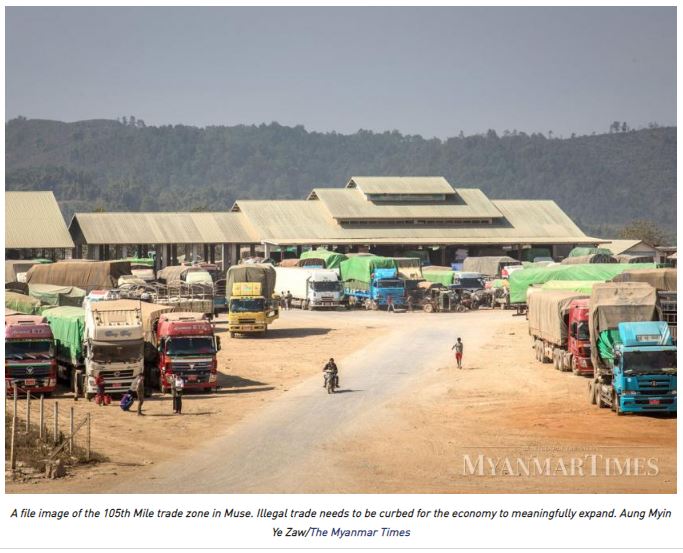Myanmar: Illegal trade takes a heavy toll on country’s economy
Smuggling and illegal trade continue to be a major problems for the country’s economy, says the Union of Myanmar Federation of Chambers of Commerce and Industry (UMFCCI).
According to the Business Sentiment Survey issued by UMFCCI in May, illegal trade stands at sixth among the top 10 issues hampering the country’s economy.
The survey was conducted to learn more about the current situation of businesses in Myanmar.
Illegal trade encompasses products from neighbouring countries entering Myanmar via unofficial trade routes and also domestic products being smuggled out.
The survey revealed that businesses feel that illegal trade is the second largest issue dampening sentiment, behind only a weak economy, and is among the top five points the government should address as part of efforts to boost the economy.
The survey highlights how big a problem illegal trade is for the country’s economy.
Illegal trade hinders economic development as a result of money flowing to non-state groups; disruption of the economic model; and loss of tax revenue for the state, said Ms Marie Pegie Cauchois, deputy country manager of the United Nations Office on Drugs and Crime (UNODC) Myanmar, during the country’s first Anti-illicit Trade Forum held on September 5.
Among the most pressing examples of problem are the illegal exports of local rice to China, which has sprung up over the last three years. While the government allows controlled exports of rice to China, the amount being smuggled is believed to be growing, say people in the rice trading business.
“Selling or exporting rice illegally is an illicit trade. If the government does not encourage illicit trade then it has a responsibility to stop the problem from occuring,” said U Nay Lin Zin, secretary of the Myanmar Rice Millers’ Association.
Due the illicit nature of the trade, the amount of rice being smuggled into China cannot be determined precisely, but it is believed to pose a growing threat to domestic food security and local businesses.
During a meeting with the Private Sector Development Committee, led by Vice President U Myint Swe, on October 6, the Myanmar Rice Federation requested that effective measures be taken to prevent the illegal exports of rice.
Minister of Finance and Planning U Soe Win said that prevention policies are being drafted and arrangements for implementation to effectively prevent illegal trade in every state and region.
But even as policy is being drafted and measures planned, both the government and the public are sustaining losses due to the illegal outflow of resources and raw materials from the country and the inflow of illegal products from neighboring countries.
Euro Monitor International, an international market research organisation, stated that just the illegal beer trade in Myanmar cost the government between US$48 million and US$52 million (K76 billion and K82 billion) in lost tax income last year.
“Because of illegal products entering the country, the government is losing taxation income and the public sector is also suffering as they lose their competitiveness. Because of illegal trade, domestic businesses are sustaining losses to a certain extent, said Myanmar Industries Association Chair Dr Aung Thein.
“Official businesses have to pay taxes and fees for registration and certificates, but the illegal ones don’t do the same so they can sell at lower prices. Official businesses can’t compete with illegal ones. Legitimate SME importers and producers will not be able to compete with goods brought in illegally. As a result, they lose market share and eventually disappear,” he said.
Among the business sectors most badly hit by smuggled goods entering the country are the small-scale producers of domestic foodstuffs and makers of electronic devices, said UMFCCI Secretary U Aung Kyi Soe,.
“The worst thing about the illegal products is that they make substandard products with attractive packaging and this is decimating the domestic small-scale foodstuffs,” he said.
Illegal trade is mainly occurring along the border areas with China and Thailand. As part of efforts to control smuggling the government set up the Yay Pu inspection gate on the Mandalay-Muse road and Mayan Chaung inspection gate on the Bago-Myawaddy road with the cooperation of the Ministry of Planning and Finance and the Ministry of Commerce.
Tax evasion, the breaking of trade regulations and the existence of many illegal trading routes is in danger of rising due to poor enforcement, said Union Minister U Soe Win for Planning and Finance in a meeting with Private Sector Development Committee and private businesses.
Vice president U Myint Swe said in the same meeting that, under the instruction of the Union Government, state and regional governments have started cracking down on illegal trade by forming special task forces.
“The authorities are trying to stop illegal trade, but they haven’t been able to stamp it out completely yet. There are many illegal trading routes so it makes them difficult to control. That is why, the government is also combating this problem by creating barriers not unlike customs departments in other countries, in addition to inspections at checkpoints and setting up special task forces,” said Ministry of Commerce Deputy Secretary U Khin Maung Lwin.
Myanmar is on a list of countries with high levels of illicit trade and stands last among 21 Asian countries in the 2018 Global Illicit Trade Environment Index produced by the Economist Intelligence Unit.
Source: https://www.mmtimes.com/news/illegal-trade-takes-heavy-toll-countrys-economy.html


 Thailand
Thailand




